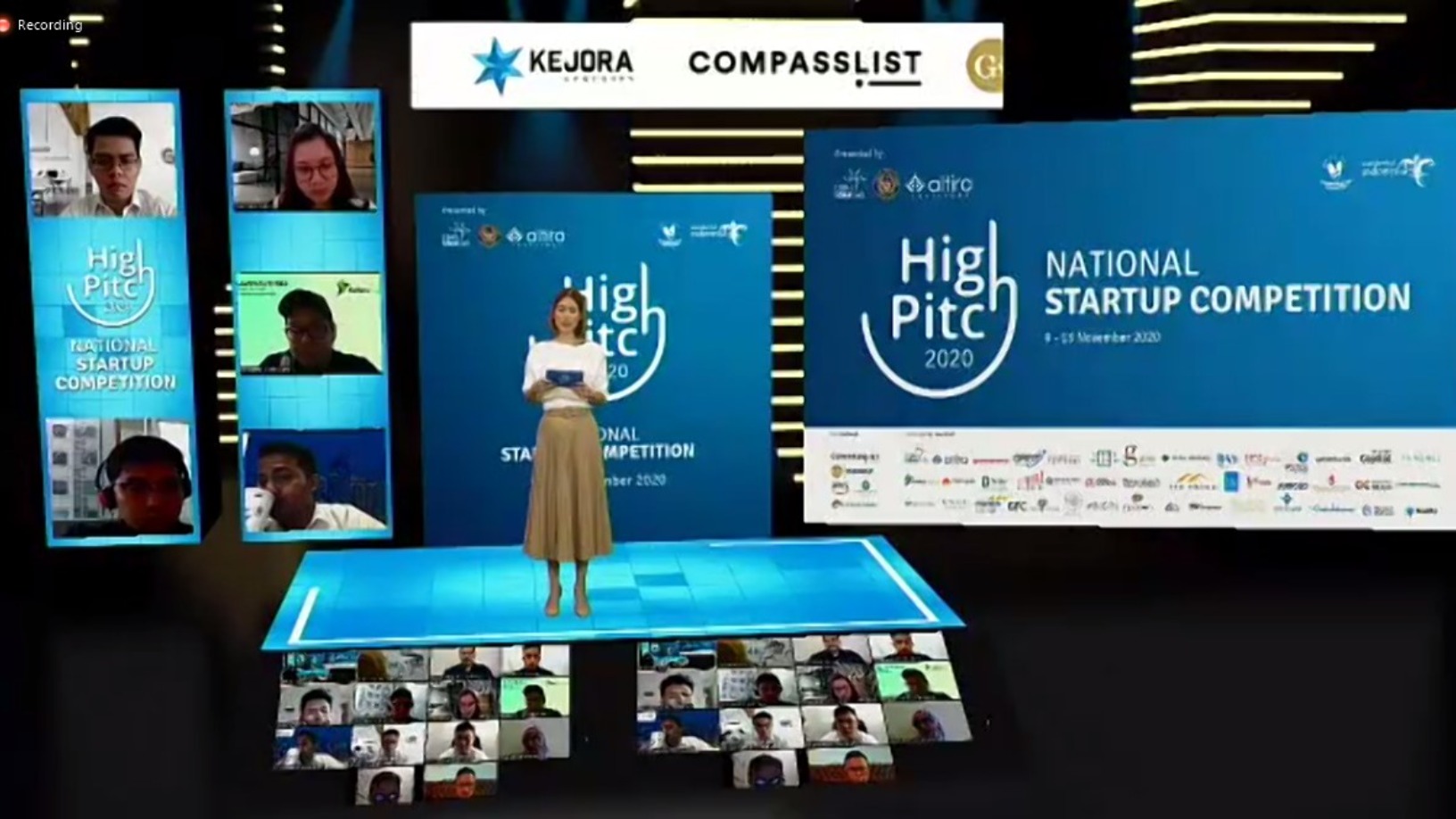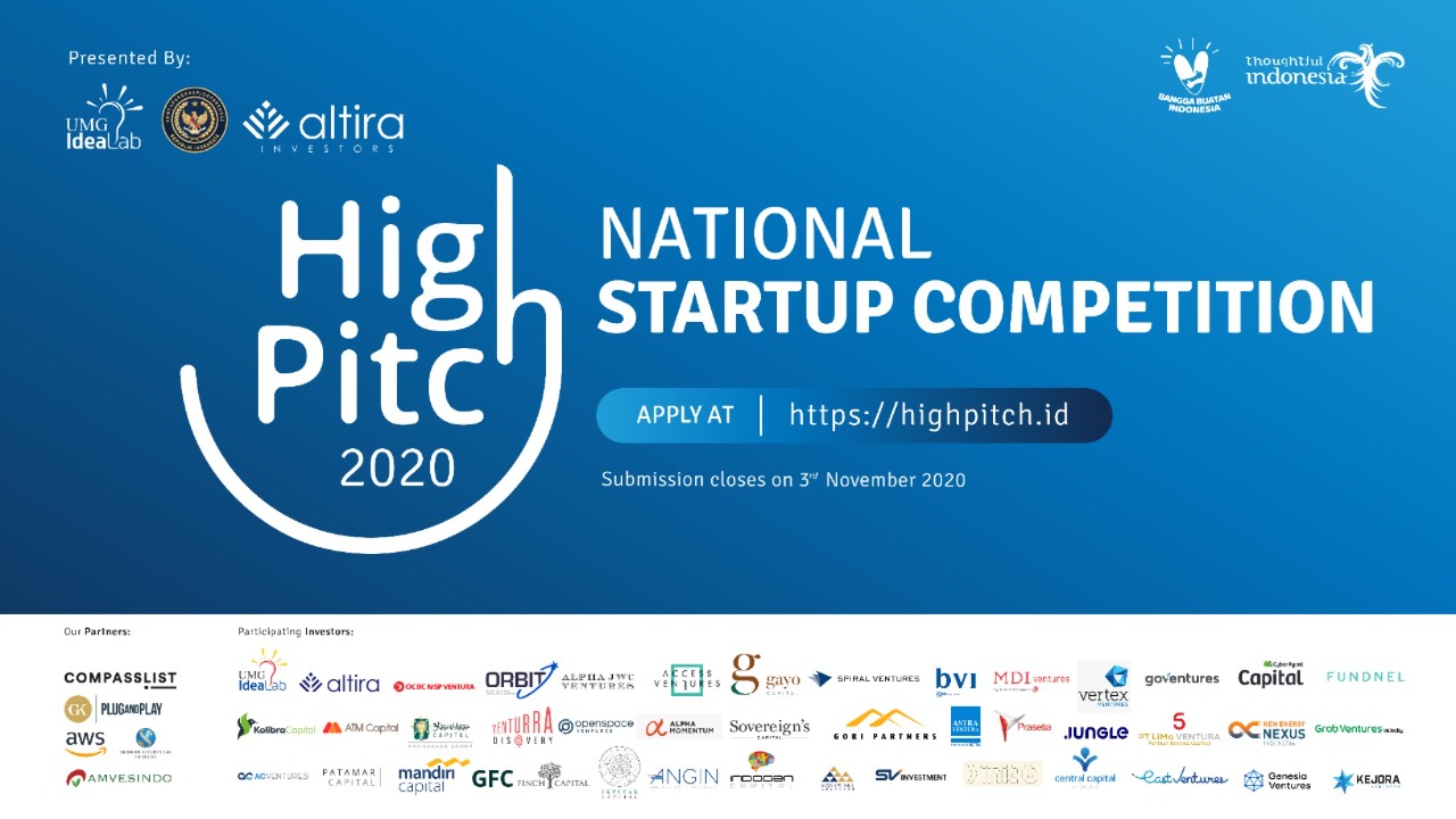HighPitch 2020, the nationwide online pitch competition for Indonesian startups, has begun in earnest, opening with the Sumatra regional contest on November 9. Appskep, which is developing an edtech platform for future healthcare workers, and Pasar20, an online grocery platform, emerged winners and will join other regional finalists in the grand final on November 25.
In all, 10 startups from the Medan chapter, which covers the entire Sumatra island, pitched to a panel of judges from 10 VC firms. Global Founders Capital, GoVentures (the VC arm of Gojek), SB Investments, TNB Aura and Kolibra Capital presided over the first half of the competition. For the second half, Accion Venture Lab, Astra Mitra Ventura, ATM Capital, Central Capital Ventura and Prasetia Dwidharma took over the judging.
CompassList spoke with four VC investors after the session to get their opinions about HighPitch and the competing startups. Daniel Jayasaputro, Business Development, at Astra Mitra Ventura; William Auwines, Senior Investment Analyst, of Kolibra Capital; Matthew Adrian Tirtamarta, Investment Associate, at ATM Capital; and Samuel Chong, Investment Manager, from TNB Aura also discussed current trends in Indonesia’s startup ecosystem, and provided advice for entrepreneurs building their business amid the Covid pandemic.
HighPitch is jointly organized by Indonesia’s Ministry of Tourism and Creative Economy (Kemenparekraf/Baparekraf) and investors UMG Idealab and ALTIRA.
The following has been edited for length and clarity.
HighPitch was launched because startups have been looking for opportunities to pitch to investors, while the investors themselves are looking for new deals during this pandemic. From your experience, how has the situation been, in terms of deal sourcing and meeting the startups?
Daniel Jayasaputro (Astra Mitra Ventura): We have been more careful and selective in assessing deals during Covid-19. Generally, we are looking for startups that can support our business in seven pillars, including, finance, automotive, agriculture, mining and logistics. In particular, we seek startups that can support us in cost reduction, efficiency and generating additional income.
Samuel Chong (TNB Aura): Since the pandemic hit, investors have become more conservative, in that we are more skeptical about “growth at all costs" businesses. Now we want to see at least an optionality for the startups to hit some level of profitability. It doesn't have to be net profit, it doesn't have to be EBITDA-positive, but at least the gross margin has to be positive. It doesn't have to be now, but the startups need to demonstrate how they can get there, the path to profitability, should things get worse.
In terms of the difficulty in deal sourcing, we definitely felt some impact, because we can no longer travel to Indonesia, be on the ground and get to know people. So the deals that we tend to see in Singapore tend to be those with online presence or those connected to our venture partners, who tend to be based in the bigger Indonesian cities. Definitely, we won't see much of what is going on beyond the tier-1 cities [like Jakarta and Surabaya], unless we have some direct connection there.
Now we want to see at least an optionality for startups to hit some profitability… It doesn't have to be now, but startups need to demonstrate how they can get there
William Auwines (Kolibra Capital): In terms of deals, there has been an increase in the amount of online startup events and accelerators – there's one happening every week or two. I think the pandemic has a sort of silver lining for us at Kolibra. We get to cut back offline meetings and the time spent. Previously we needed to travel between places to meet startups and wait for them. Now it's a bit more efficient in terms of deal sourcing and meeting the startups.
But when we need to physically meet them to do due diligence, then it gets a bit more complicated. But I would agree with what Samuel said. We put more weightage on profitability; that has become much more important.
Matthew Adrian Tirtamarta (ATM Capital): We've always focused on profitability and positive unit economics, now with higher margins than ever before. During this pandemic, it has been quite hard for our partners who come from Beijing, as it's hard for them to travel here. Now when they want to perform due diligence checks, they have to entrust it to their representatives in Indonesia. Before, they were the ones who did it with us.
We're also focusing on our portfolio management and on how our investees survive during this pandemic, especially in terms of cash runway. We're still quite sector-agnostic; we try to find any kind of deal that we can find. Right now deal sourcing is easier because more startups are using LinkedIn these days.
In general, what have you noticed about the Indonesian startup scene over the past two years? Have you observed any significant changes or shifts in trends in terms of technologies, business models or the quality of startups?
Chong: Notwithstanding the pandemic, there are still some underlying circular trends in Southeast Asia. Indonesia is definitely the frontrunner in terms of changing demographics, rising middle class and increased digital penetration. My thinking is that these things will not change, but the types of business models that investors will prefer will change and those that are likely to succeed will also change.
We are looking for more scalable businesses, perhaps those that can skip the offline presence step and reduce capex. Previously startups often had to go through O2O before going pure online, but this pandemic presents an opportunity for the ecosystem to skip the O2O step. But of course it doesn't apply to all sectors.
Auwines: For the past couple of years, the VC landscape in Indonesia has been growing at a good rate in terms of the number of VCs, CVCs, business angel offices, family offices and investments in startups.
In terms of trends, there's always a flavor of the year. For example, we had a year that was all chatbot. In 2018, it was social commerce/advertising through WhatsApp. For sure, the flavor of this year is healthcare and edtech. We're not a fan of that flavor-of-the-year influence, to be honest, because we would always want a neutral viewpoint.
Tirtamarta: I've seen some changes in how Indonesia’s GDP is generated. More of it is now from outside of the tier-1 and tier-2 cities. We are focusing more on the supply chain side, focusing on tier-3 and tier-4 cities with big market sizes. A lot of FMCG players are also focusing on these cities.
I've seen some changes in how Indonesia’s GDP is generated. More of it is now from outside the tier-1 and tier-2 cities
Zooming into the focus of the day, the startups in the Medan chapter, which cover the Sumatra island. What's your impression so far of the startups that pitched today?
Auwines: I was really looking forward to it and I'm quite surprised, because I mostly look at startups from Jakarta. We rarely come by startups from outside Jakarta. But a full event focusing only on Medan like this, it's great to see how diverse the business models and the startups can be. It was really refreshing to see startups from a new geographical area.
Tirtamarta: My fellow associate is from Medan and he's an ex-founder of a successful startup, so for the past few years, startups from outside of Jakarta have been approaching us. It's good for entrepreneurs from these regions to try and start their own business, but the best thing to do for us is to support them and give advice, even though we may not finally invest in them.
Jayasaputro: Before, we mostly looked at startups from the Greater Jakarta area. Because of this event, we can see more potential startups from other areas like Medan. They have good ideas and we are looking forward to seeing the traction from them.
Chong: My impression of the startups that presented today – although it might not be representative of all the startups outside of Jakarta – is that they are solving unique problems; things that I, being based in Singapore, wouldn't be able to think of.
I think the next base of growth from Southeast Asia will not be in tier-1 cities. The problems they are solving and the business models they are building are unique to those regions and they provide valuable insights on what the next wave of trends would be. They have some catching up to do versus those in tier-1 cities, but I guess it's just a function of time and guidance from investors like us and from early-stage investors. It's very interesting and we'll be watching these spaces closely.
We had 10 startups pitching today, but surely there are many startups out there hustling and developing their business. What advice would you give entrepreneurs today, given the situation?
Jayasaputro: As investors, we are looking for the things that Samuel and Matthew mentioned before – the financials: healthy financial condition and a clear business model. By that, I mean, the revenue stream is clear, and not money-burning.
Tirtamarta: We always look for the value startups can add to the traditional industries, how they create change and social impact. We always look for startups that can make huge changes, because if they make a huge positive change and society likes it, the revenue side will follow, usually.
Nobody will make the perfect pitch deck the first time, but getting to know people or cold-emailing is a good way to improve
Another thing that we like is how they can charge up their revenue model. If you can bring so much impact to society, for sure, revenue will follow. But if you have 10m users and you charge only $1 a month, the revenue is going to be quite low for such a big scale. So we’d always want to know about how they can develop a revenue model with positive unit economics.
Auwines: If I were to give advice, I would tell them to not be afraid to use LinkedIn or cold-email investors and other people. You have to align your interests with the investors and ask to meet; pitching will bring you closer. Nobody will make the perfect pitch deck or startup the first time, but getting to know people or cold-emailing is a good way to slowly improve your pitch deck and business model, by getting input. You don't even have to go that far, just talk to your connections, other startups. Having a back and forth with your friends, other startups and investors, is important.
Chong: Other than not being afraid to reach out, I think founders should reach out to startups and investors across different stages. The reason for this is to always re-test and revalidate your hypothesis on value proposition, size of market, etc. Finally, you shouldn't be afraid to pivot or make slight adjustments to your business model. If investors aren't too interested in your business model, it means there might not be enough precedence in it to give investors confidence.
CompassList is the official media partner of the HighPitch 2020 National Startup Competition.












